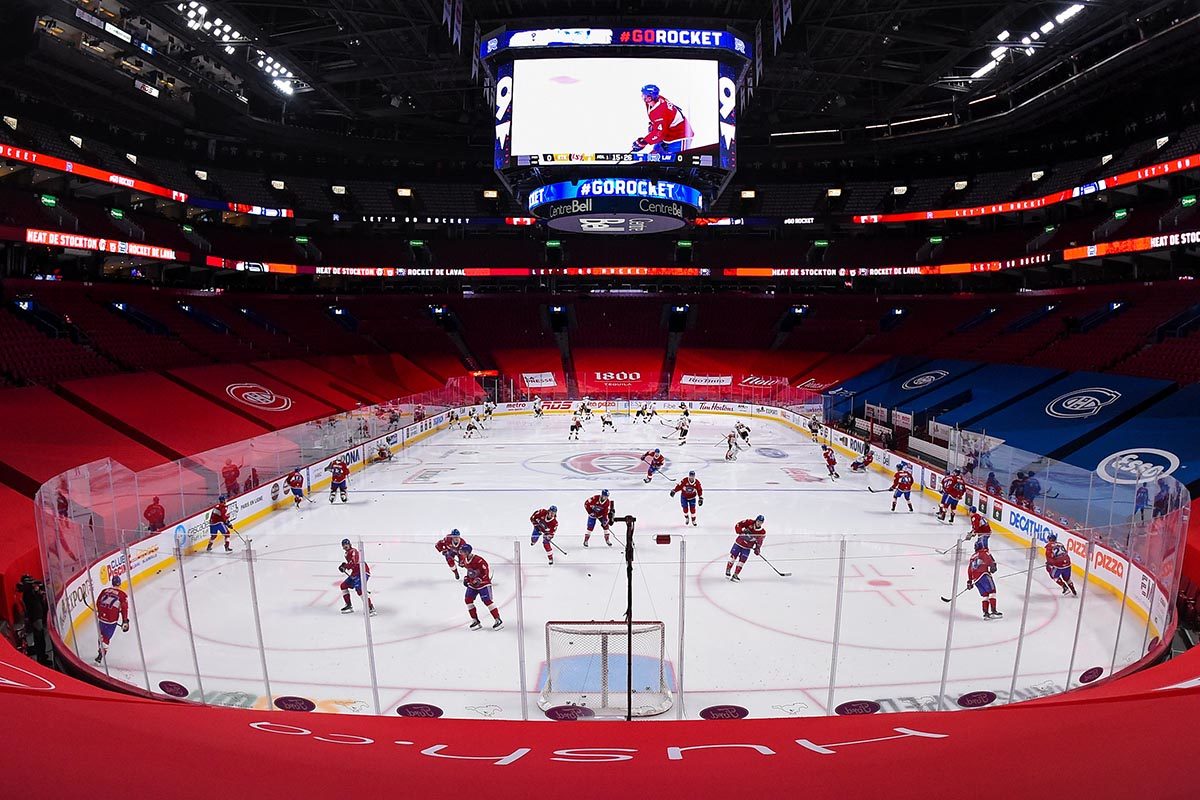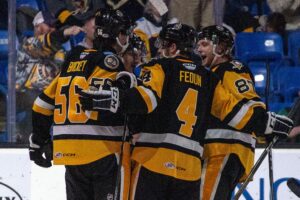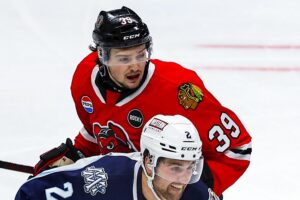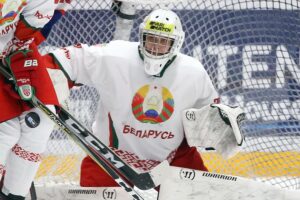📝 by Patrick Williams
Improvisation, sacrifice, and flexibility have long been among the personality traits that hockey demands for success, be it on or off the ice.
The past year ― and beyond, really ― has especially tested those qualities, and the American Hockey League has not been exempted from those trials created by the COVID-19 pandemic.
Practice, test for COVID-19, and go back home or to the team hotel until the next practice or game on the schedule.
Whether it was one COVID-19 test after the next, strict adherence to league protocols, unpredictable lineups, games being played in empty arenas, or not being able to play for a Calder Cup, people around the league had to adjust and find new ways to develop their talents individually and collectively. That group included players, coaches, hockey staff, management, and the front-office staffs that help to keep the National Hockey League’s top development league churning out talent.
AHL fans have endured their own challenges and own personal struggles as well across the 31-team league. For the AHL’s first 84 seasons, a night at the rink could ease those difficulties or at least provide a needed escape for a few hours. Then came the 2020-21 season, and the pandemic denied most fans a chance to see in person some of the top young talent in hockey preparing for the NHL.
And the 2021-22 campaign has presented more than enough of its own challenges right through the year’s final day as the AHL and the rest of society try to beat back a virus that has upended life around the world. On New Year’s Eve, roster limitations forced Grand Rapids Griffins head coach Ben Simon to dress only 14 skaters in an emotional 5-4 victory against the Milwaukee Admirals at Van Andel Arena. That improvisation pushed the Griffins past the stubborn Admirals.
“I think you have to have a great support staff,” Simon began, “and a bunch of players [who] buy in and are willing to believe in themselves.
“I’m really, really proud of those guys.”
There was sacrifice, and plenty of it. Last season the Providence Bruins spent three months commuting between their Rhode Island home and the New England Sports Center in Marlborough, Mass., mainly playing weekday afternoons in an empty practice facility. All the same and without complaint, the P-Bruins captured the Emile Francis Trophy as the Atlantic Division champion last season.
“[The players] wanted to make sure that they got everything they could out of the season, and they did so,” said former Bruins head coach Jay Leach, who is now an assistant coach with the Seattle Kraken.
Or take those long bus trips back and forth across the Midwest when the Iowa Wild arrived in town and underwent COVID-19 testing at 3:30 a.m. on many a night last season.
“We wouldn’t have gotten through it if the guys weren’t committed,” Iowa head coach Tim Army stated bluntly. “And they were, and that goes for the [support] staff as well.”
Then there were the dual affiliations that demanded flexibility. With the Charlotte Checkers sitting out last season, the Syracuse Crunch and Tampa Bay Lightning welcomed Florida Panthers prospects to their AHL set-up. The Springfield Thunderbirds were unable to play, so the St. Louis Blues prospects joined forces with those of the Vancouver Canucks to represent the Utica Comets. And the Chicago Wolves and idle Milwaukee put their rivalry aside to develop Carolina Hurricanes and Nashville Predators players with the Wolves.
“[Syracuse players] told me that during their time here, there was only one team,” Crunch head coach Ben Groulx said after last season. “And that was something early on, I didn’t want any players to think that the coach [was] playing favorites.
“We told them early on that we wanted one team.”
Life has been nerve-wracking as well. Uncertain, too.
“It’s unbelievable,” Henderson Silver Knights assistant coach Joel Ward termed the 2021 experience. “Words can’t really describe this [past year].
“Personally, it has been hitting home pretty hard. Hockey-wise, just coming to the rink, [there have] been a lot of difficulties. Having meetings in different rooms and having practice times split up into different groups. It [has been] a lot of uncertainty.
“[2021] was actually pretty scary, to be honest. You’re coming to the rink to play hockey and hang out with your coaching staff, your friends, your buddies, and your teammates, and next you know, we are plagued by this COVID.
“It’s scary stuff.”
Not everything was different, of course. Through it all, the Hershey Bears excelled once again in 2020-21, taking the Macgregor Kilpatrick Trophy as the AHL’s overall regular-season champion with a 24-7-2-0 (.750) mark. They also earned their sixth division title since beginning a wildly successful affiliation with the Washington Capitals in 2005-06.
With little left to prove after playing nine full seasons and 650 regular-season games in the NHL, Bears captain Matt Moulson came to Hershey in 2019 with one objective ― to win a championship. Last season did not provide an opportunity to chase a Calder Cup, but Moulson cherished the experience all the same.
“I sent out a text to the guys,” Moulson said back in May after the Bears took the regular-season title, “and honestly, I started to get a little emotional sending that. You play a long time and getting first place in the league, that’s the best you can get [in 2020-21]. It was definitely an accomplishment.
“I’m so proud of all these guys and everyone that’s been here throughout the years. It was a great feeling.”
The Utica Comets, who play before some of the AHL’s most passionate fans, welcomed the New Jersey Devils as their new NHL affiliate in the offseason. With that move, the Vancouver organization was able to realize a long-desired goal to have a geographically convenient AHL affiliate just an hour away with the birth of the Abbotsford Canucks.
There were other big victories off the ice as well. The Silver Knights successful launched their first season as the Vegas Golden Knights’ new local AHL affiliate, one that culminated with a spirited three-game back-and-forth series with the Bakersfield Condors for the Pacific Division title this past May. Later this spring, the Silver Knights will move into the new $84 million, 6,000-seat Dollar Loan Center.
The Coachella Valley Firebirds, Seattle’s future AHL affiliate, are scheduled to begin play in the 2022-23 season in Palm Desert, Calif. There, they will play out of the Coachella Valley Arena, an under-construction $250-million, 10,000-seat gleaming facility just off Interstate 10. Elsewhere in the Pacific Division, the San Jose Barracuda will have their own dedicated home next season when they head into a 4,200-seat building being constructed at Sharks Ice at San Jose, the practice facility for both the AHL club and the parent San Jose Sharks.
On Saturday the AHL announced that the regular-season schedule will be extended until April 30 to allow clubs to reschedule postponed games. That move will push the conclusion of the Calder Cup Finals to as far as the end of June, the latest the league has ever staged its postseason.
Again, adapt and find a way. If the past 21-plus months have taught anything, it is that life has a way of disrupting plans. Simon has helped guide his young Grand Rapids roster through this time preaching some of those same lessons.
“Who knows what tomorrow will bring?” Simon asked. “But our motto is, especially with all the stuff going on, kind of simple. ‘Win the day.’
“Let’s try and get a little bit better. Let’s win today. And if we get kicked in the teeth, we’re going to get back up and try to win the next day.”

TheAHL.com features writer Patrick Williams has been on the American Hockey League beat for nearly two decades for outlets including NHL.com, Sportsnet, TSN, The Hockey News, SiriusXM NHL Network Radio and SLAM! Sports, and was most recently the co-host of The Hockey News On The ‘A’ podcast. He was the recipient of the AHL’s James H. Ellery Memorial Award for his outstanding coverage of the league in 2016.






































